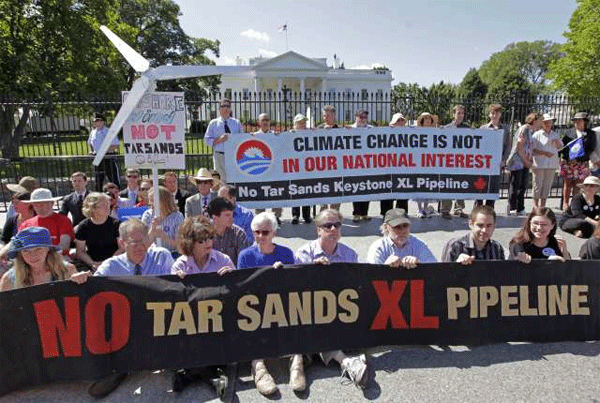It was one of those uncomfortable moments when you suddenly realize you’re in the wrong place, that you’re a rube from the sticks in a sophisticated city whose customs you don’t quite understand.
Politico was sponsoring a “Washington Year in Review” symposium last week, and they’d invited me to be part of the energy panel. So even though I’d spent barely three weeks in Washington this year (and the most memorable nights were spent in its central cellblock for protesting outside the White House to block the Keystone XL pipeline), I found myself traveling down from Vermont to share a stage with Rep. Ed Markey (D-Mass.) and Rep. Lee Terry (R-Neb.).
I was a little nervous, because Terry had recently introduced a bill to force the rapid approval of the Keystone pipeline, overriding the president. But we talked back and forth amiably enough, as I explained why the jobs figures for the proposed project he kept repeating were wrong. Markey pointed out that the Canadian tar sands oil that would be transported through the pipeline, far from enhancing U.S. energy security, was destined to be sold abroad. It was all “agree to disagree” harmony.
But then, in passing, I said something that to me seemed so obvious it didn’t even occur to me anyone would object: that it was clearly Big Oil that wanted the pipeline revived, and that it was using the congressmen it funded heavily to make it happen.
Beside me, I could feel Terry bristle. He quickly interjected, something to the effect of, are you saying that we’re “bought off”? And I suddenly felt bad, as if I indeed had said something wrong. I stammered; I tried to say I didn’t know anything about him in particular, that I was sure he’d eventually be part of the solution and so on. But the frost stayed in the air; he seemed genuinely hurt that anyone could think he had a conflict.
Read the rest at the LA Times
Photo: Environmental activists outside the White House on August 22 protesting the proposed Keystone XL pipeline from the Canadian tar sands to the US Gulf Coast. (J. Scott Applewhite / AP)
